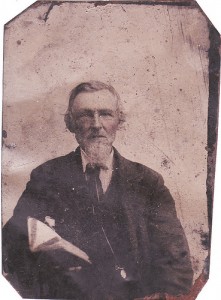 God originally called the nation of Israel to Himself and established a covenant with them. However, because of their disloyalty they forfeited this claim on God. There is frequently the thought that it is amazing grace of God that the whole people were not consumed and that a Remnant continues to inherit the election. The Israelites were elected to service and that one element of service was a universal mission to the world. Within Israel itself, however the thought is a collective one, either of the whole people or of the group that constituted the Remnant.
God originally called the nation of Israel to Himself and established a covenant with them. However, because of their disloyalty they forfeited this claim on God. There is frequently the thought that it is amazing grace of God that the whole people were not consumed and that a Remnant continues to inherit the election. The Israelites were elected to service and that one element of service was a universal mission to the world. Within Israel itself, however the thought is a collective one, either of the whole people or of the group that constituted the Remnant.
*Those who are truly called come from God’s chosen people.
Within the elected nation, individuals were also chosen for service. Several are said to have been chosen before they were born, and in this way it is emphasized that their election is not the reward of their worth. They are not chosen for what they are, or even primarily they will be, but for a specific task that is assigned them and for service God requires of them. For that service they are equipped by God, and all that is required of them is humble obedience to His will and surrender of themselves to His power.
* Calling has nothing to do with talent, skill, gifting, or worthiness.
Some are chosen to be judges and kings, to be God’s vice-regents among His people, to deliver them from their foes and to rule them in His name. Gideon was chosen to deliver Israel from the Midianites [1] , and Sampson, even before his birth, was chosen that he might be a thorn in the side of the Philistines.[2] In the story of the establishment of the monarchy, Saul was chosen by God to enable Israel to throw off the yoke of the Philistines. There are two accounts of the setting up of the monarchy in the Biblical story. According to the latter account the institution had its origins in nothing more exalted than a popular desire to imitate foreign nations, and it was in itself an act of disloyalty to God and rebellion against Him. According to the earlier account the initiative was with God, who said to Samuel, “About this time tomorrow I will send unto thee a man from the land of Benjamin, and thou shalt anoint him to be the leader over my people Israel; and he shall save my people from the hand of the Philistines, because I have seen the affliction of my people, for their cry has come unto me.†[3] Acting on these divine instructions, Samuel privately anoints Saul, who then takes the lead in the rescue of Jabesh Gilead and is in consequence hailed as king by all the people.
* God alone chooses what the calling will be to, i.e. the task to be performed
David was later chosen to replace Saul. Of the rejection of Saul we have two accounts. One attributes it to his impatience in not waiting for Samuel at Gilgal, [4] while the other attributes it to his failure to annihilate the Amalekites. [5] It should be noted that Saul’s failure to annihilate the Amalekites sprang from a defect of character. He accepted the commission of Samuel as the command of God, and yet failed to carry it out, because he set his own will above the will of God. The other story reveals an impatience of spirit, while all the story of Saul there is apparent an instability of character that marred his achievements. But here in this story of the Amalekites there is revealed a deeper defect of spirit, and a rejection of God’s will as final for him. If then election is for service, and its first corollary is loyalty of spirit to God, and if the abandonment of that loyalty is equivalent to the renunciation of the election, Saul had indeed renounced his election. He had revealed the attitude of his heart towards God, and it was no longer serviceable.
* One can disqualify himself from a calling of God by a rebellious and sinful heart.
How prophets were recruited is still unclear, but what we do know is that of several prophets we have some record of their Divine call to their office. They were not prophets because they were born to the office, or because they fancied the life, but because they felt a constraint which they believed to be of God. It is frankly recognized in the Old Testament that to tell a true prophet from a false one was no easy matter. Of the call of Moses in the wilderness, of Samuel in his childhood in the shrine of Shiloh, of Amos when pursuing his daily work, of Hosea in the tragedy of his domestic life, of Isaiah in the temple, of Jeremiah in his youth, and Ezekiel in the bizarre vision that came to him, we have a familiar record. All of these men became prophets because the hand of God was laid upon them. Some tried to resist the call, only to find that it could not be resisted. Amos 3:8 says, “The Lion hath roared, who can but fear? The Lord Yahweh hath spoken; Who can but prophesy?â€
* God seems to delight in calling all “types†of people to be His.
All this would imply that the call of the prophet was the arbitrary act of God, and especially if he was called before he was born. Yet there is much in the Old Testament to indicate that it was neither arbitrary, nor so irresistible as the experience of the greater prophets would suggest. There were prophets who did not fulfill the purpose of their call, and who stand under sharp condemnation. The edge of their spirit’s sensitiveness became blunted, and no longer did they feel the command and constraint of God’s hand. More are called to service than truly respond to the call. There is a paradox in this area of calling. The prophet’s response to the call that he feels the irresistibility of the constraint, and he who most justifies the call and fulfills its purpose is most conscious of the Divine element and least conscious of the human element in his commissioning.
Paul could feel himself to be the “chief of sinners,†and it has ever been the case that the nearer a man becomes to God the nearer he wants to come, for it is only he who is very close to God who can feel the gulf that separates him from God. It is apparent that the true prophet is thought of as one who stands in so close and intimate a relationship with God that his personality becomes the vehicle of God’s Word.
* The effectiveness of a called man of God is directly related to his closeness with God.
God calls men by His own volition and gives them abilities to perform the tasks they are asked to do. God always calls individuals to particular acts of service (a pastor, youth leader, associate pastor, etc.) and as with any position, especially that of a pastor, his effectiveness in that position is dependent upon his closeness and dependence upon God. When the one who is called turns from God, he is no longer usable and will be replaced. The calling process appears to be a personal matter between an individual and God, whereby the latter places His hand upon that person “in a special way†and directs them to a position of leadership within the church body. But there is also recognition of this calling by a body of believers and the apparent power of the prophet.
* God will give His called one what he needs to perform his task and will empower him to show that he is God’s man.
[1] Judges 6:15
[2] Judges 13:3-5
[3] 1 Samuel 9:16
[4] 1 Samuel 13:8-14
[5] 1 Samuel 15



